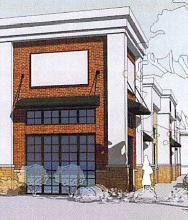
Update: The Thursday City Council meeting where these loans were to be considered has been postponed. The matters likely will be taken up by the council Tuesday at 10 a.m.
The oversized check Mayor Ray Nagin handed Zulu on Lundi Gras may have sparked noisy debate, but a far less sensational loan from the same City Hall source likely will have a louder legacy.
When Nagin approved the $400,000 Zulu loan, he also approved a $2.5 million loan for a $25 million complex of live music venues, restaurants and commercial production studios near the intersection of St. Bernard and North Claiborne avenues in the Seventh Ward. Thursday, the City Council could vote on whether to release the money to the developer of the ambitious urban revitalization project known as Inspire. (Download the 80-page proposal as a pdf here.)
The council could also consider a vote to give the loan to Zulu.
The vote to authorize a loan agreement between the city and Inspire developers Glenn and David Amedee comes nearly a year after the council unanimously approved a request to rezone the project site at St. Bernard and North Robertson Street, one block east of North Claiborne Avenue and a few minutes walk from two existing venues run by the brothers: The Wisdom Reception Hall and an upscale lounge called The Perfect Fit.
Last year’s rezoning allows larger facilities than previously permitted. Plans for Inspire include a concert hall able to hold upwards of 2,400 people and a ballroom with a capacity of 1,200.
Glenn Amadee envisions the area as an attraction that will draw in a clientele of middle- and upper-income African Americans from around the region. The draw will be an upscale setting with live R &B, jazz and gospel musicians who Amadee says don’t have a venue in the region.
“The white folks who own venues don’t want African Americans, and they don’t play the music that African Americans want,” he said in an interview following a recent community meeting. “Black people don’t go to Bourbon Street. They don’t go to House of Blues. We find that they do come to our bars and they will come to the Inspire.”
With its neo-classical, columned façade and tidy manicuring, the two-story Wisdom sticks out from surroundings otherwise marked by neglect. An upscale lounge with a strict dress code barring sneakers, athletic wear, white T-shirts and “long shirts,” The Perfect Fit also stands in marked contrast to other bars in the neighborhood where men in oversized white T-shirts mill on the front steps.
On a recent Thursday evening, The Perfect Fit was crowded with men and woman who looked fresh from an office in collared shirts, dress shoes and blazers. Mingling at the bar was the District C City Councilman who represents the area, James Carter. Carter co-sponsored the ordinance authorizing the loan. The application for the loan, which comes from the city’s Urban Development Action Grant fund, states that the Amedees built The Wisdom between 1996 and 2004, paying “out of pocket at a time when financial institutions were not interested in the area.” Following Katrina, the section of St. Bernard Avenue near North Claiborne Avenue was declared one of the city’s 17 Target Recovery Zones .
Glenn Amedee lives in eastern New Orleans, but grew up in the Seventh Ward, a fast bike ride from the venues he now operates. Before he began to focus on the redevelopment of St. Bernard Avenue, he worked in the construction industry. He was last in the spotlight during the last stretch of the mayoral administration of Marc Morial, when he worked with a subcontractor for energy-efficiency contractor, Johnson Controls.
If the loan is approved, the Amedee brothers must get building quickly. Under its terms, all three buildings in the complex must be complete within 18 months of the loan being given, barring a major disaster or “other factors” beyond the developer’s control, the agreement shows. The agreement also states that the project must “generate jobs for approximately 35 employees,” and live up to the description outlined in the loan application.
While the agreement states that the contractor must get written approval from the city for any “program changes,” it does not outline what kind of recourse the city has if the development does not meet the expectations laid out in the application. It also does not spell out penalties for a failure to complete the project in the allotted time frame.
The agreement says that the city “has determined that the project serves a public purpose” and that the project will result in more than $2.5 million worth of “financial benefits.” Beyond the statement, however, there is no evidence of an economic impact analysis or any other third-party study. Amedee said last week that the project’s financing was “95 percent” sewn up and that the team was on track to move forward as scheduled. “I can’t fix the city,” he said, “but I can fix four blocks and we are on our way.”
Under the terms of the loan, the developer will repay the city at a 3.5 percent interest rate over the next 15 years. Payments will be made monthly, the agreement shows. All money must be spent according to a budget laid out as part of the loan application. Spending must be reported on a quarterly basis and if reports are not made, the contractor will be fined.
The city is also empowered to audit the project until five years after the loan is repaid. The $2.5 million in money must be kept in its own bank account and not mixed with other funds. If changes are made, they must be “consistent with the purpose of the UDAG loan agreement” and any changes that amount to more than 10 percent of the budget require written approval from the Executive Assistant to the Mayor. This means that until Nagin leaves office, his aide Kenya Smith would be responsible for approving changes.


